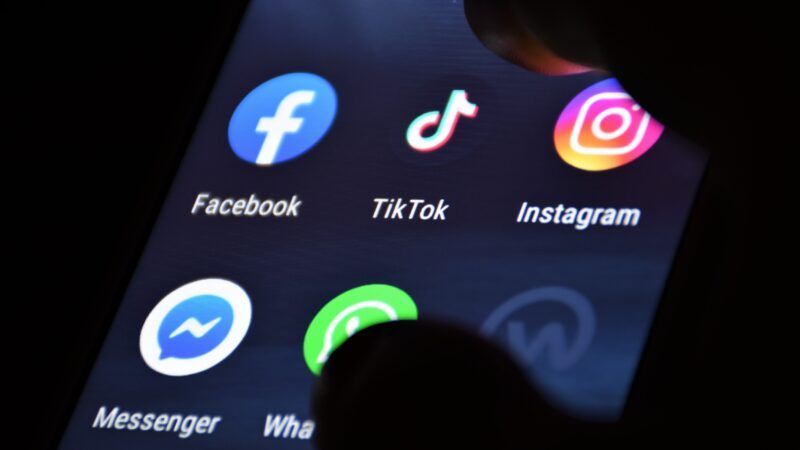The Feds Roll Back Their Influence Over NPR Only To Claim Greater Influence Over TikTok
Politicians' interest in controlling the content you see shifts from public media to social media.

For decades, Republicans threatened to defund the Corporation for Public Broadcasting (CPB) only to stay those cuts in exchange for more conservative-friendly programming.
It was a surprisingly libertarian twist this month, then, when the Republican-controlled Congress passed the White House's recission bill that eliminated funding for the CPB—an institution that subsidizes National Public Radio (NPR), the Public Broadcasting Service (PBS), and their local affiliates, among other operations.
As noncommercial broadcasting adjusts to a world without federal subsidies, the Trump administration is trying to force a sale of the social media company TikTok's U.S. operations from its China-based owner ByteDance to a new consortium of American investors.
U.S. Commerce Secretary Howard Lutnick told CNBC recently that "Americans will have control. Americans will own the technology, and Americans will control the algorithm."
The forced sale of TikTok's American operations is required by a law passed last year forbidding any company from distributing, maintaining, or updating a "foreign adversary-controlled application" within the U.S.
To prepare for that sale, TikTok is reportedly preparing an American version of the app.
"The new app is expected to use only data from U.S. users to train its recommendation algorithms, further distancing it from TikTok's global systems," reports Reuters. "As a result, most users will be recommended content generated within the U.S.,"
So while American taxpayers' dollars won't be going to the new American TikTok in the way they once flowed to public radio, the U.S. government's forced sale of the app will nevertheless have a major influence over the content that American TikTok users will see.
As Reason's Jesse Walker noted in a recent piece on the history of funding fights over public media, "it is not unprecedented for a president who hates much of the media to deploy big government as a weapon in one moment and to pull government back in the next."
To be clear, the Trump administration's effort to orchestrate a sale of TikTok to American investors is downstream of a congressional mandate. Indeed, the administration arguably acted illegally by not already forcing the still-ByteDance-owned TikTok to shut down.
But it has still landed in a paradoxical position. Its successful push to defund the CPB has withdrawn government influence over one form of media. Its forced sale of TikTok's American operations is simultaneously expanding government influence over another form of media.
Given how many more people use TikTok than listen to NPR, Washington's net influence over the media that people consume is growing, not shrinking.
One can't help but wonder whether Republicans' willingness to cut public radio subsidies, as opposed to influence its content in a more conservative direction, is a tacit recognition that radio and TV matter less than they used to. Social media is where the eyeballs are now, and that's where politicians are most interested in influencing what those eyeballs see.
The libertarian case for defunding public media was always quite straightforward: a free press requires voluntarily supported media outlets.
Government subsidies inherently compel speech. They require taxpayers to support media they don't consume (or, in the context of liberal-leaning public radio, that they might object to), and they give politicians more influence over the programming decisions of nominally independent outlets.
Neither outcome is particularly good if you're for people saying and reading what they want without the influence of the state. That's what the "free" in free press is supposed to mean.
A truly free media environment demands freedom from government influence over content. That's not the world we live in, even if the CPB no longer receives federal subsidies.
Rent Free is a weekly newsletter from Christian Britschgi on urbanism and the fight for less regulation, more housing, more property rights, and more freedom in America's cities.


Show Comments (7)